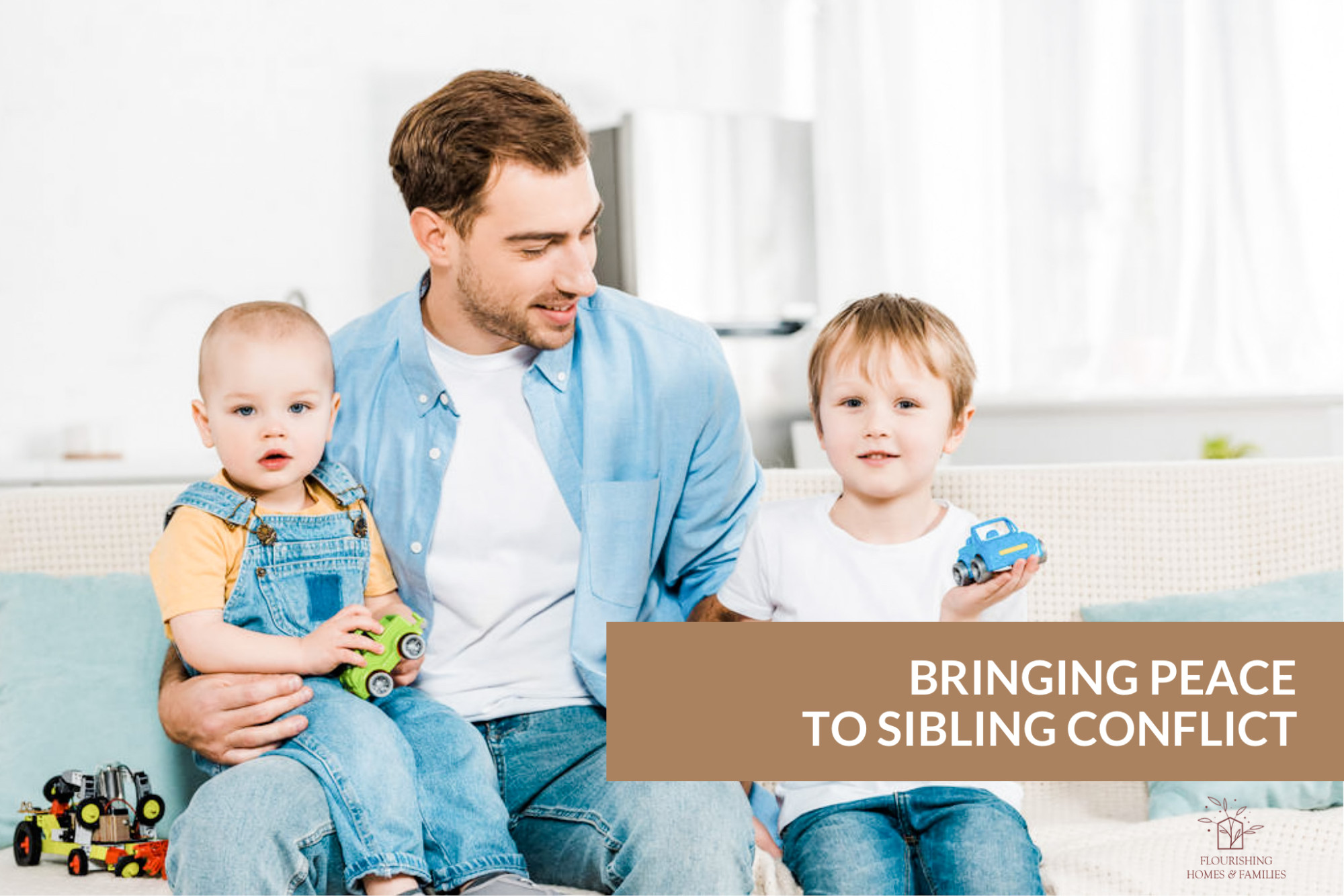
Do you ever find yourself in a feeling of crisis when dealing with conflict between siblings?
It is a tough spot to be as a parent because they are our babies and yet we see that one of our precious littles is wronging another of our precious littles. It can leave us feeling sad, appalled, triggered, or helpless.
Sibling squabbles can really send a parent into a frenzy.
We live in a world where there are always things fighting for our attention. And when one of these bickering matches breaks out when we are already late for church, heading out the door...
Or have been really pre-occupied all day, we find ourselves saying things like:
“Go to your room right now!”
“Stop that immediately!”
“Apologize to her right away!”
“He said he was sorry, you need to forgive him now.”
I want to suggest to you, as someone who has been there…
We must learn to shift our mindset from dealing with something immediately to dealing with something effectively.
We can help our children learn to be people of peace by teaching them how to hold onto their peace and how to get it back if it somehow slips away. The scientific world calls this emotional self-regulation. And it is a skill that takes years to develop.
If we can teach them this beautiful skill, as well as how to communicate their needs and listen to the needs of others, they will begin to navigate conflict confidently and correctly.
It doesn’t matter if it is a simple game of copycat that got out of hand or something like hair-pulling.
Dealing with a dysregulated child’s behavior immediately will almost always involve hurt feelings, angry words, and a lack of direction moving forward.
Dealing with a dysregulated child’s behavior effectively will almost always involve reconnecting, co-regulation, and resolution.
A simple pause to read a book or do a puzzle might be just what your child needs to get into a space where they feel safe with you to work through the issue you want to help them resolve. Some of my favorite ways to reconnect with my children are puzzles/chapter books/back scratches/petting our dog together/sharing a handful of chocolate-covered almonds, and painting together.
So next time you find yourself in a tizzy over sibling conflict, look for a way to reconnect and then focus your efforts on navigating effectively rather than immediately.
Looking for more help or not sure about how to teach respectful conflict resolution to small children? Check out our Sibling Conflict workshop:
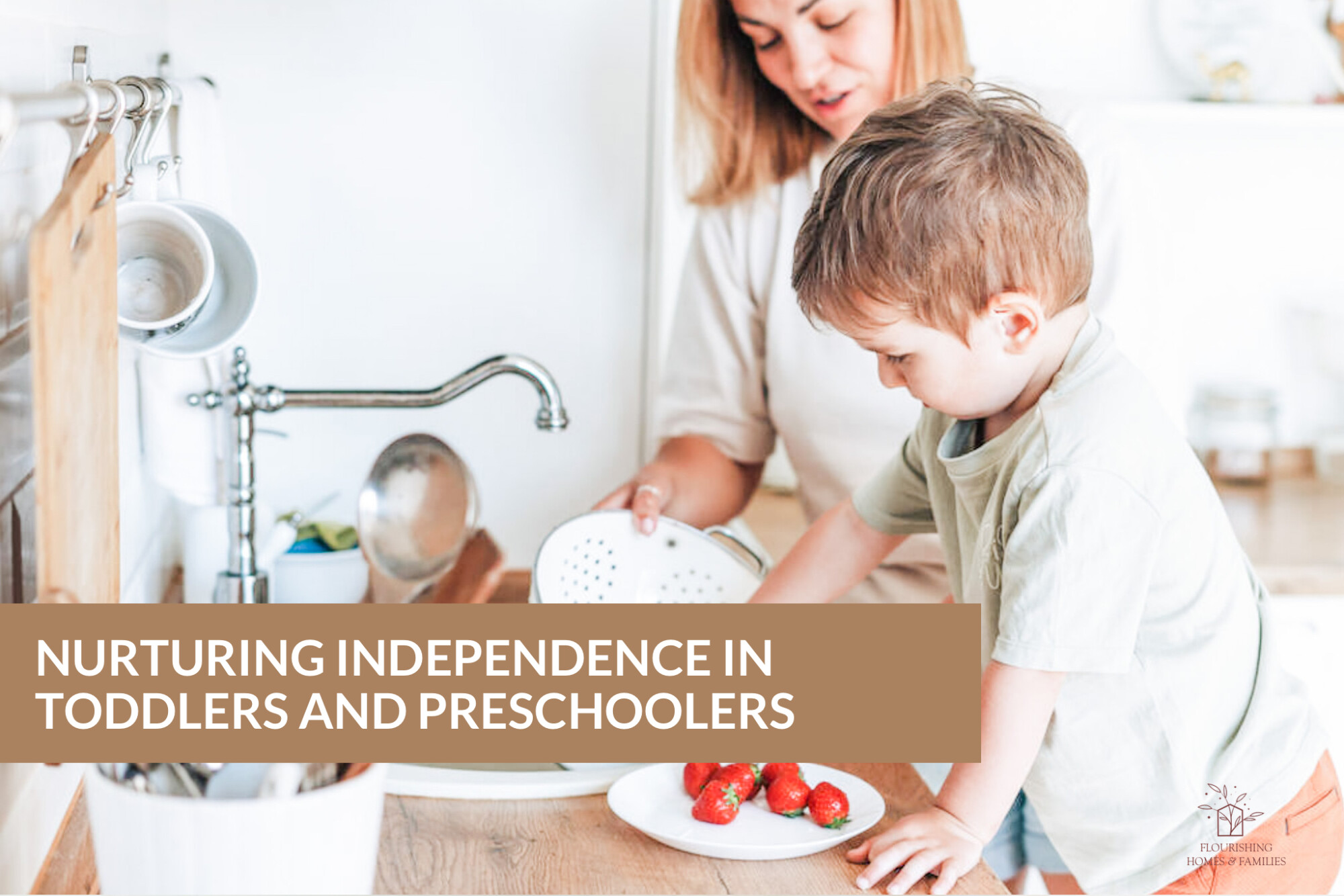
Imagine living in a home where every time you need something you have to ask your spouse.
Thirsty? Find your husband and ask him to stop what he is doing and go to the big cabinets where all the drinking glasses are out of reach and fill the glass up with water from the sink which is also too tall for you.
Hungry? Again, go look for a more capable person who can suggest things to you because you have no idea what the grocery inventory is or how to prepare what you want to eat.
Feeling tired and want to relax on the couch with a book? Maybe this time, the person who does everything for you will give you instructions and encourage you to take your already tired self into your room so that you can “grab your cozy stuff” only, grabbing your cozy stuff really means you’ll need to make multiple trips from your room to the couch. And you’ll have to do this while dragging and pulling pillows, blankets, and stuffed animals that are bigger than you are.
This sounds like a joke, right? These scenarios would be frustrating to anybody.
But for many kids (and some adults), this is their life every day.
Sometimes grown-ups just don’t give kids enough credit here because we have forgotten what it is to be a small person in a big world.
In our home, we began implementing a lot of changes to give our kids independence, and I’m not exaggerating when I say that I immediately saw less frustration.
Independence does not look the same for everyone, but I do want to share some suggestions for you to evaluate for yourself and see if/how they may fit into your home with your family.
Practical tips to encourage independence in toddlers + preschoolers
- Bring things down to their level: For us, we went room by room and asked 2 questions→ What does my child need/do in here? + Is there a way I can safely make it easier for him? For example, a simple faucet extender or wooden stool could safely make time in the bathroom less frustrating. Clearing out a drawer in the kitchen to fit all of the kid cups + bowl and setting up a little water station with a water dispenser gives him the ability to take care of his own needs when he is thirsty. Something as simple as setting up a few command hooks + shoe basket at preschool eye level makes getting out the door a lot easier for us. These things will look different for everyone, but I encourage you to go room by room and ask yourself the same questions.
- Set up an easily accessible way for them to take rest as they need it: Imagine how frustrating it could feel to get yourself situated for rest time as a little person. As adults, we are probably used to grabbing a throw blanket, a pillow, a beverage, and a snack and getting it all set up just right. But kids can’t do that as easily because those things are just bigger and harder for them. It takes a lot of energy to just go get a pillow. In our home, I have rest time items easily accessible. Kids can have their own throw blankets in a basket near the couch, rest time books + fidget toys have a small space nearby and snacks and drinks are easy to grab. This also brings a much more enjoyable attitude to the idea of rest because now it rarely begins with a meltdown or frustration.
- Sit down and plan together: I like to sit down with the kids at breakfast and say something along the lines of “Here is what we need to get done today, is there anything you think we should add to the list?” I might even ask for suggestions on the order of the list being completed if I have the flexibility on that day. This is also a great way to model flexibility.
- Set them up to be helpers: Sometimes kids just need to know they are needed. If we put ourselves in their shoes again, it could feel deflating not to be old enough, big enough, or strong enough to contribute to the community you are a part of. This looks so different in each family and even with each individual kiddo. But some ideas for this would be getting kid-sized kitchen tools that allow them to actually help. A wavy chopper or wooden chopper has helped us tremendously with keeping things calm during meal prep time. The kids love to know they are helping our family and it keeps them busy with a meaningful task. Something like a simple broom and dustpan set that they are able to reach and use when you need some help is also another great way to do this.
- The ability to get ready for the day on their own: One of the best mom decisions I ever made for our family was doing capsule wardrobes for the kids. Does anyone else ever feel they are drowning in kids clothes and still finding time to argue about clothing choices with a 3-year-old?! Making the switch to keeping (about) 15 articles of clothing for each child that are all seasonally appropriate, easily accessible, and that also match together helped in a lot of ways. If you have a child that likes (or needs) some extra time taming the hair–an eye-level mirror with hooks for a hair brush + hair ties + headbands can be a fun addition as well.
At the end of the day, your home is a safe place for your family and how you set it up is totally and completely unique to you. These ideas are just meant to encourage you to look at that place through the eyes of your child who is learning and developing so much every day. Sometimes a frustrated child is a child who just needs to know they can do something–anything– all by themselves that makes them feel important. So let’s get down in those feelings with them and help them see the beautiful, capable, competent, and important people that they are.
I want you to know that I understand how hard it is to brainstorm some of these ideas on your own–especially when you feel you’re riding the struggle bus in the toddler + preschooler frustration department. So if you’re feeling a bit stuck here and want to join the conversation, come have a seat at our table, grab a cup of coffee, and let’s figure this out together.

I want to talk a little bit about what it means to be a place of peace for your child.
Sometimes, in the trying moments, we may feel the need to step away from the situation or our child so we can calm down. We certainly all need to just take some space from the crisis sometimes. But I want to remind you that we as parents are gifted not with our own inner peace, but with the peace that comes from abiding in Christ.
“I am the vine, you are the branches; he who abides in Me and I in him, he bears much fruit, for apart from Me you can do nothing.” John 15:5
Jesus, while speaking with His disciples, spends a great deal of time explaining that the safe place for them is abiding in Him as their place of peace, ability, and safety because Jesus is abiding in the vital source of life in all its fullness–God himself.
As parents, we do not take the place of Jesus, but we do build our model after Him and we see that He offers us a space within Himself that allows vulnerability and protection.
When we understand abiding in Christ and live in this every day, we are able to be that place of peace for our children because we abide in Christ, and Christ abides in the Father. We are offering ourselves to be a link in the chain that helps connect our children with their creator.
One does not simply bounce in and out of this abiding business. It is a conscious choice–a lifestyle. But it isn't quite as easy as giving you a checklist of things to mark off to make sure you're abiding in Him. How I wish it were that easy!
Ultimately, abiding in Christ is not about doing all the things, rather it is resting in our identity in Him.
When we find our true identity in the One who created us, we are freed from misplacing our identity in the things that so quickly tempt us: how tidy our homes are, how obedient, how many Bible verses we have memorized, how much we accomplished around the house or for the Kingdom.
We do not have to strive for, work for, negotiate or argue for, defend, or take credit for Christ’s unconditional love for us.
He is just as much at work in us when we’re dancing in praise to Him as when we’re dancing around toys on the floor. His faithfulness to us is just as steadfast when we read our Bible for an hour as it is when our Bibles sit in the car forgotten since last Sunday. His peace is available to us as reliably when our children are tucked snuggly in their beds and the house is quiet as it is when chaos ensues and screaming and crying and tantrums are the soundtrack to our days.
How I wish I could give you the indescribable gift of this freedom: abiding in Christ is about His faithfulness and goodness, not about how hard we’re holding on to Him. Jesus-Centered parenting, abiding in Christ is giving radical surrender to our weakness so that we can depend wholly on His strength. The world tells us to defend, hide, be ashamed of it, and deny our weakness. Jesus invites us to welcome our it as a sacred reminder to abide in Him and His strength.
To be sure, we can develop holy habits that remind us of Christ's faithfulness. But we must recognize that these habits are about being with Him, not about doing more or trying harder.
Ultimately, as we abide in Christ we will begin to see evidence of His work in us:
The fruit of the Spirit:
One of the evidences we are abiding in Christ is by bearing fruit–we are told what some of those fruits look like. I find that being familiar with something and putting those things into practice can be two totally different things. It may be a good idea to make a chart or write them out in a place where they are continually before your eyes as you a reminder of the work He is doing in you and through you. Yes, you may have to practice gentleness and peace many times over! But the work isn't yours to do alone! But the fruit of the Spirit is love, joy, peace, patience, kindness, goodness, faithfulness, gentleness, self-control; against such things there is no law. Galatians 5:22-23
Looking for opportunities to learn from Jesus:
How do we do this? Make time to spend with Jesus. For some people that looks like taking a chunk of time in the morning to soak in the word and be in prayer. For others in more busy seasons, it may simply be taking time to pause and bring the Lord into your day, or using the chromecast to put on a scripture playlist while you’re busy at home. Whatever the case may be, abiding in Christ looks like being drawn to spend time with Jesus and learn from Him how we can put His model Kingdom way of living into practice as a parent. Take my yoke upon you. Let me teach you, because I am humble and gentle at heart, and you will find rest for your souls. Matthew 11:29
Letting the Peace of God rule in your heart:
This is simple–stop striving for peace as though it’s something you can wrestle down. Remember who the Lord is and that He is always a non-anxious presence whom you can trust. Don’t let your mind be led down all sorts of rabbit trails. Practice, instead, letting the peace of God rule in your hearts. It’s not something to force. It is something to simply allow. It may take some practice, but if Jesus told us to, I can promise you it is worth it. Let the peace of Christ rule in your hearts, to which indeed you were called in one body; and be thankful. Colossians 3:15
Your unique story needs to be told in unique ways.
God is writing the beautiful story of you. The failures, conflicts, and struggles that arise in your story are part of what makes you unique. We know that the application of the scriptures we shared may very well look a little bit different for each of us, but ultimately, they will all point to Jesus.
When we focus our energy on being peaceful, regulated, and steadfast we are able to bring those things–and Jesus– into every situation.
This abiding does not fail us because Jesus doesn’t fail us. Instead, it brings peace to the chaos and our children are able to regulate and be at peace much more easily when we are doing just that.

I see you. I’ve been you.
It feels like you’re hiding in a closet somewhere because you grew up in a pro-spanking or pro-punishment culture but you’ve decided to raise your child with grace and respect instead.
The people around you think you’re nuts for choosing to parent as a peacemaker instead of a firm disciplinarian.
You know the truth! You’ve experienced for yourself the character of your good father, God. You know the contrast of grace vs. the law. You’ve even seen how modern neuro-science backs it up. Of course it does–it is all a part of God’s design. These kids are his image bearers, after all.
But you still feel alone. And on the hard days you ask yourself, “is this really the right thing?” They say “Motherhood–it takes a village.” But where is my village?! You wonder.
Many days you feel ill-equipped. It feels like your children are a little, or a lot rowdier than their peers, and even though you're convicted and convinced that spanking and fear tactics are wrong, you wonder what on all earth are you supposed to do instead.
You’ve been trying to navigate conflict after conflict. Some days it seems like all day. You are doing your best but some days it just feels like it is too hard. I see you sitting on the floor in the kitchen out of the kids’ view. Grabbing a handful of chocolate chips and crying a little. You look down and see you are wearing the same sweatshirt you put on a couple of days ago. Your face still has leftover makeup on it because you keep trying to make yourself feel put together but at the end of the day you’re too tired to wash it off.
I want you to know that I see another side of you, too.
I see the mom who can walk into sibling disputes, bedtime battles, toddler tantrums, and tween angst and bring in the grace of our Lord Jesus Christ. You choose to love and not cause fear. You choose to help and not to hurt. You choose to demonstrate humility and not pride. Because of that, your children trust you. They learn from you. They look up to you. And even when it feels like it isn’t true, I promise you, they love you for it.
It is this tenacious side of you that makes you a great mom. Maybe you haven’t read all of the parenting books. (When would you have time, right?!) Maybe you’re the only one in your circle who believes this grace-based parenting is actually going to pay off. It could be that most days are still hard days and you find that you are working even more on yourself than on the kids…
But let me tell you something: You are not alone in this. We want to be your village. We want to invite you to the beautiful community we're building in The Mentorship. It's a space where you can connect with others who have chosen to parent with grace and peace, and it is filled with encouragement and support for your family.
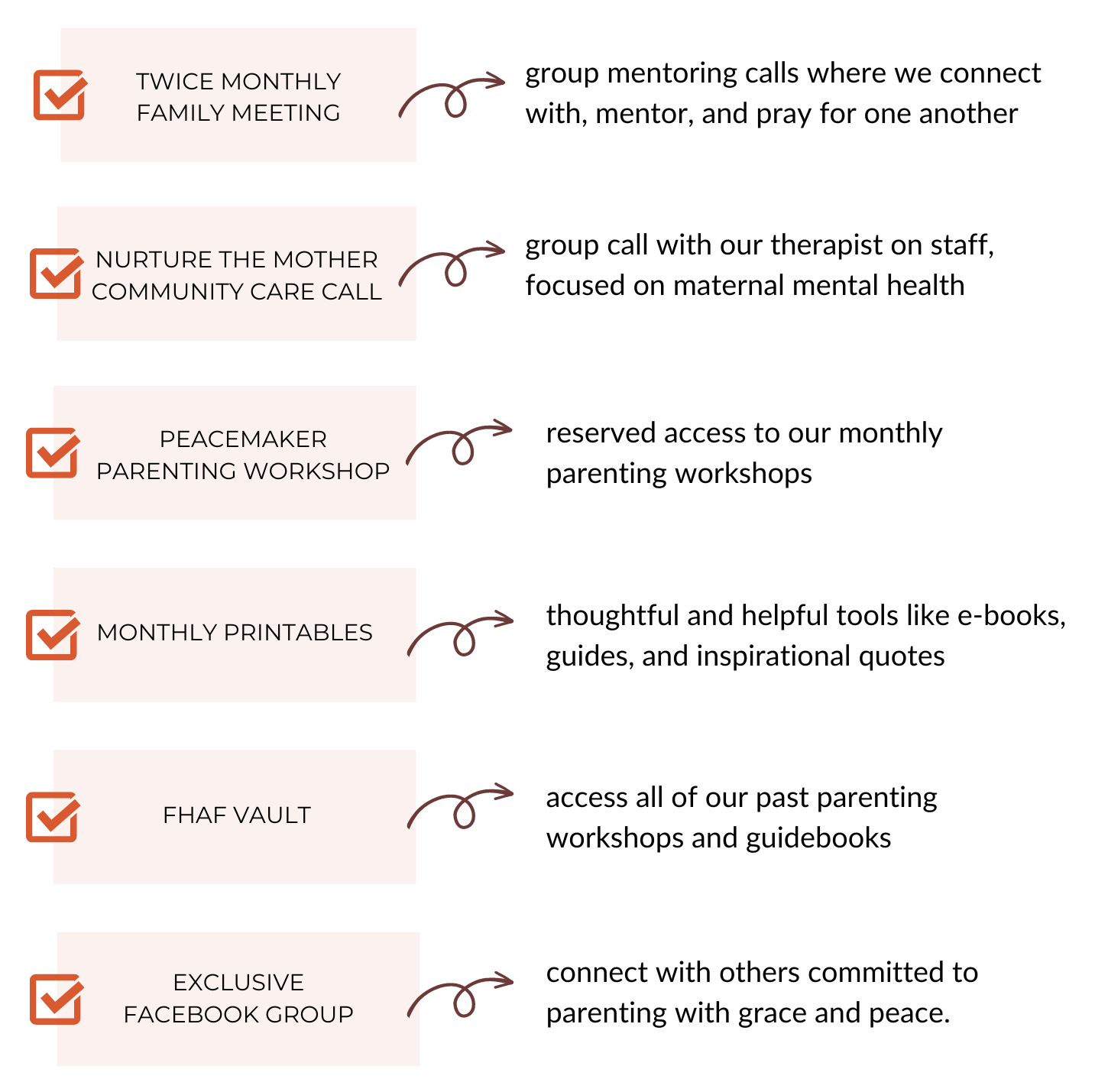
WHAT MEMBERS ARE SAYING
 | 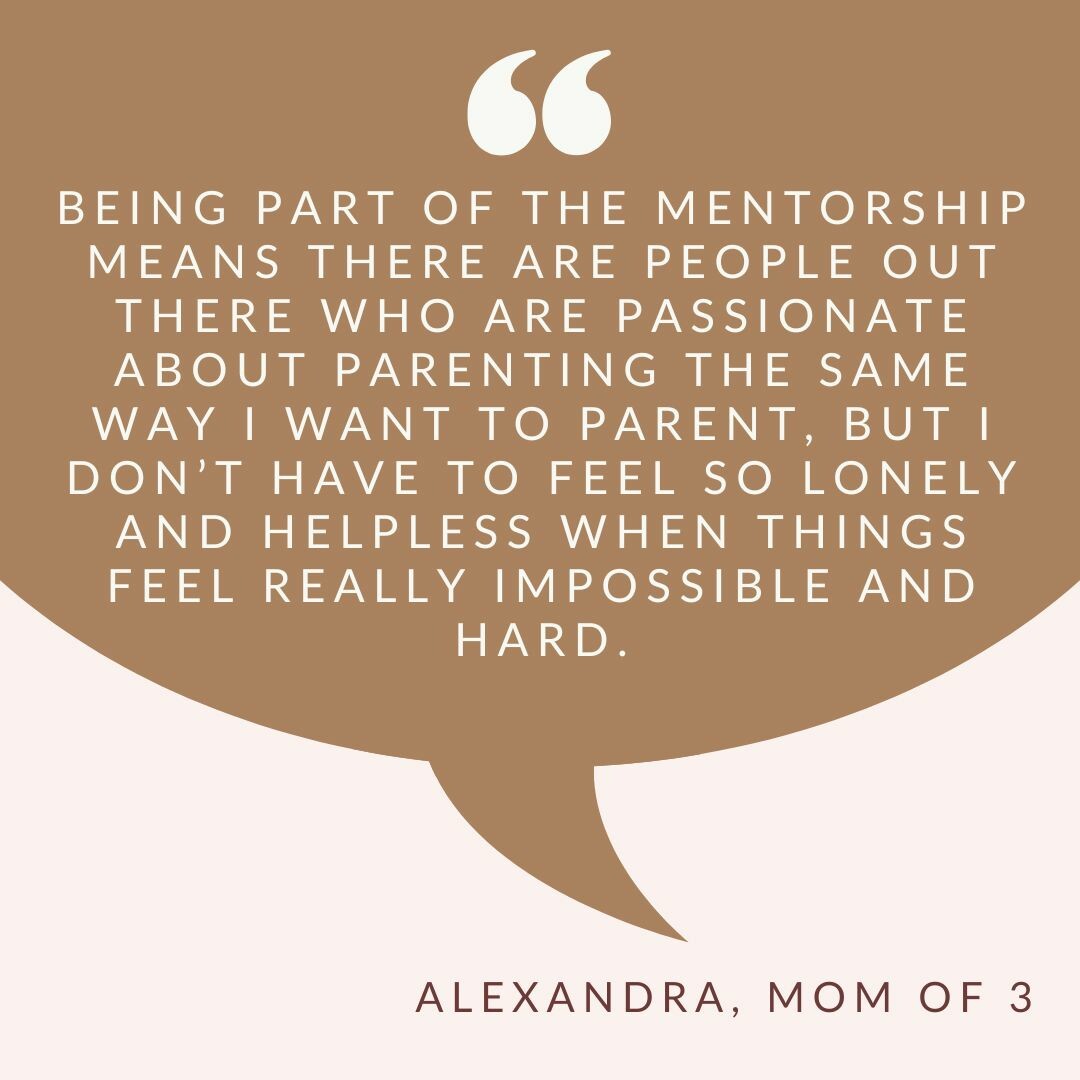 | 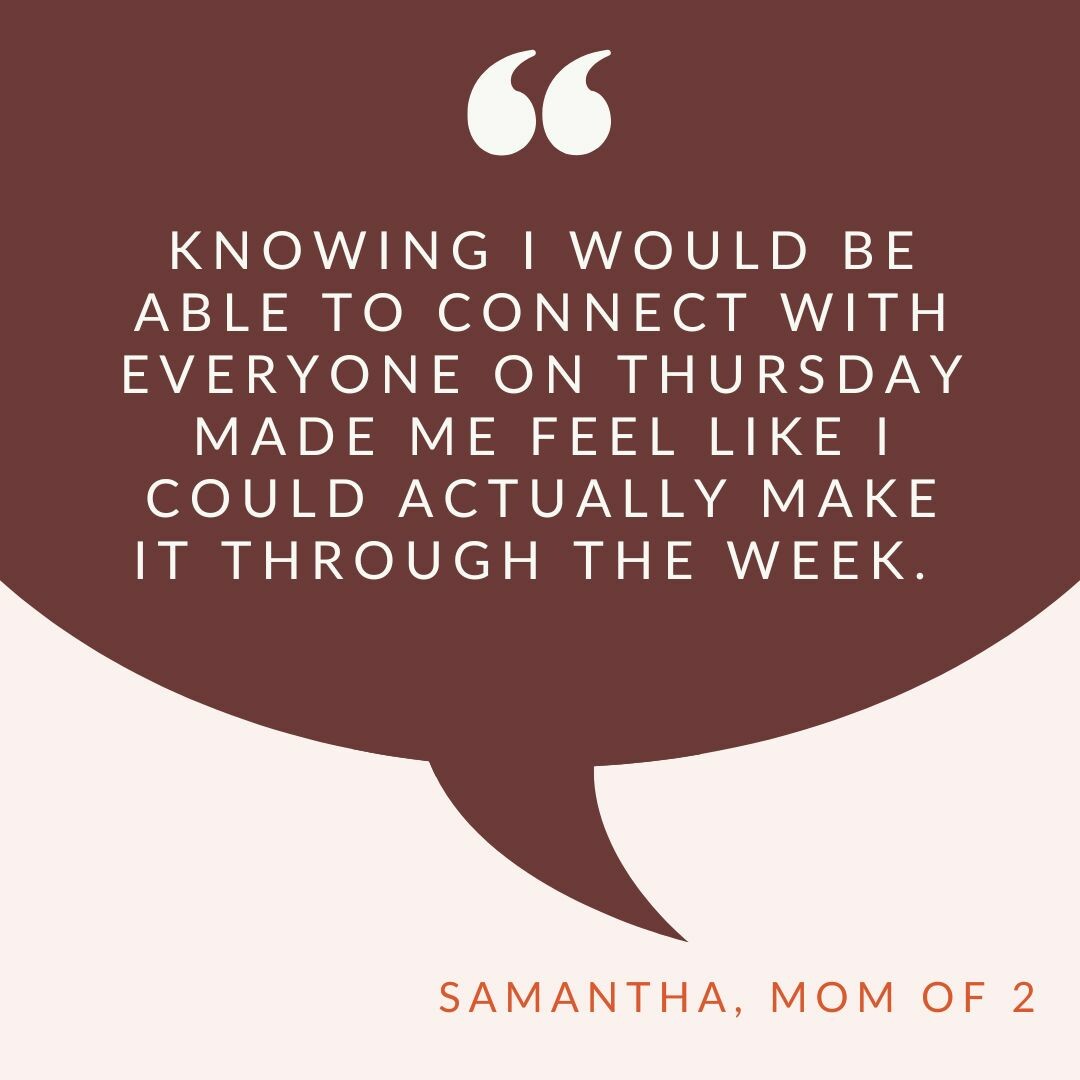 |

We were created for relationship. First, with our creator. Second, with other humans.
But what do we do when that community feels impossible to get into?
It could be that going out to meet people face-to-face feels too time-consuming. It’s hard enough to find time to eat your own meals–finding time to meet with friends is near impossible now.
It could be that you’re just in a different season of life than those around you and even when you’re with people, it drains you rather than filling your cup like it used to. Your friends are still nice, but they just don’t have the same things to consider as you do. A night out for them is just a night out. They get to go home and sleep through the night. You get to go home, tiptoe around sleeping kids, prep school lunches, and then be woken up by a nursing baby or a child who needs you. It’s not bad, it’s just different.
It could be that life just feels a little overwhelming right now and one more thing is too much on your plate. The emotional energy isn’t there.
Whatever the reason may be– you are entitled to it and I want to encourage you as a mom who has been there.
Don’t let anyone tell you that social media relationships are worthless. There is a whole community of like-minded mamas out there. I know this because I have met them myself. I have been blessed to find a few kindred souls within social media circles, but there are a few things I needed to do to make those relationships possible.
So let’s talk for a minute about how to cultivate authentic relationships on social media
- CHOOSE AUTHENTICITY: It is not sustainable to keep an edited image. Whatever your life looks like right now, just be honest. If that means you don’t have time for makeup–don’t wear makeup. If it means your sink is full of last night’s dishes–you don’t need to wash the dishes before you facetime. You get the picture here!
- QUALITY OVER QUANTITY: It is not about building up a huge followers/friends list on social media. It is about finding a few–maybe even just one– kindred mom/s to share in the day to day with you.
- BE VULNERABLE: This can be hard–speaking from experience here– but I have found that people relate to the raw and honest stuff. It is easy to share about what you had for breakfast–but are you willing to confide in a sister about how it made you feel when you had to abandon the shopping cart because all of your kids were crying and you realized you left the house without your wallet and both shoes?
- SET A SAFETY STANDARD: Demonstrate that you are a no gossip kind of person by not talking badly about other people or judging the hearts of others. I have been turned away many times by a person who uses social media as a way to elevate themselves and put others down. It doesn’t feel safe for me and I don’t feel free to share or be myself. Make sure your circle of people knows they are safe with you, to share and to be just as they are.
- COMMIT IT TO THE LORD: God is a good, good father. He knows what you need and He delights to give it to you. Take time to bring your need for community to the Lord and seek Him as these friendships form.
Listen, tired mama, I know the hardship of loneliness. I’m here to tell you that you don’t have to be ashamed of building an online community. People are people. We can love them and be loved by them no matter how we are able to communicate. Online community is still community–and that is something to celebrate!
Help us build a resource here for people looking for community by sharing how you cultivate online relationships in the comments below.
And if you're looking for a community of like-minded parents, check out what The Mentorship offers:

There's room at our table for you, sweet mama. Come join us.








